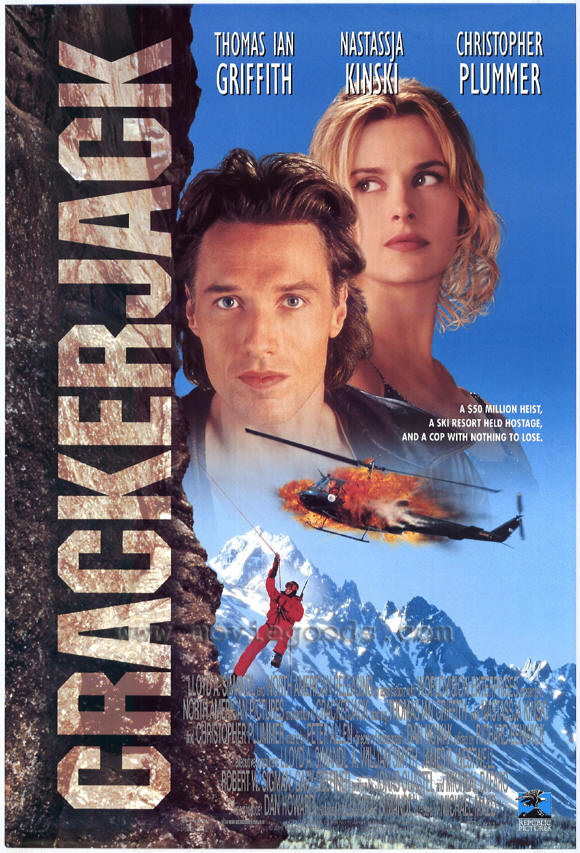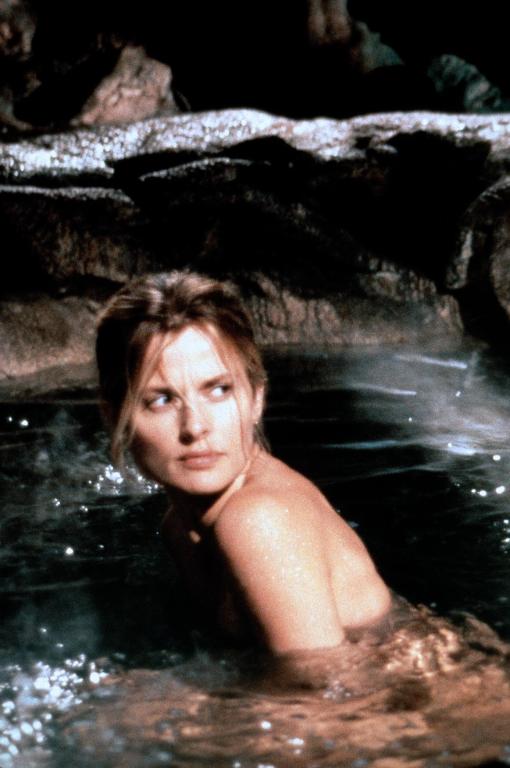Dir: Michael Mazo
Star: Thomas Ian Griffith, Christopher Plummer, Nastassja Kinski, Richard Sali
 It was certainly an interesting career move. There can’t be many people who have gone from a Wim Wenders philosophical meditation on what it means to be human, to playing the love interest in one of the more shameless Die Hard ripoffs, which seemed to come out every week in the nineties. But that’s what Kinski found for her return to Hollywood cinema, this just beating the similarly commercial Terminal Velocity to movie screens by about a month. She plays “KC”, the activities director at an upmarket ski resort, supposedly in Colorado though the film was actually made in British Columbia – she won’t tell the hero what her name stands for, saying “I’m afraid that information is reserved for relatives and close friends.”
It was certainly an interesting career move. There can’t be many people who have gone from a Wim Wenders philosophical meditation on what it means to be human, to playing the love interest in one of the more shameless Die Hard ripoffs, which seemed to come out every week in the nineties. But that’s what Kinski found for her return to Hollywood cinema, this just beating the similarly commercial Terminal Velocity to movie screens by about a month. She plays “KC”, the activities director at an upmarket ski resort, supposedly in Colorado though the film was actually made in British Columbia – she won’t tell the hero what her name stands for, saying “I’m afraid that information is reserved for relatives and close friends.”
Needless to say, it’s revealed by the end of the film, though I won’t spoil the surprise here (not least because there isn’t one – I’d have been far more impressed if it had stood for “Kraut Chick” or something). Still, it’s a bit creepy the way she sets her sights on said cop hero, Jack Wild (Griffith), since he is still clearly suffering from what his partner calls “post-traumatic shock syndrome” – must be a variant of that well-known Helsinki Syndrome. It’s a result of a previous case, where he was working undercover, and his wife and children were blown up in a car-bomb intended for him. Since then he has become that most cliched of characters, the Loose Cannon, who yells things like “Keep that sonofabitch pinned down, and I’ll get you back to your little lady!”
Now, one could say that a heavily-armed, twitchy freakazoid might not be the best person for whom to throw a surprise birthday party. But his older brother, Mike (Sali) do just that, so he and his wife Anne can give Jack tickets to come along on their trip to the mountain resort previously mentioned. What could possibly go wrong? Well, what else, except for the visit coinciding with a plan to steal tens of millions in diamonds, then blow up a glacier so it falls on the hotel and obliterates all trace of the crime. This is the concept of Ivan Getz (Plummer, who must also have had a mortgage payment due, more or less re-useing his Captain Von Trapp voice), and so you can understand why he was fired by the East German Stasi for being too loony.
 After parachuting his guys in, for no readily apparent reason [I’m fairly sure Jack, Mike and Anne didn’t get to the resort by jumping out the back of a plane. Well, Mike and Anne, anyway – Jack’s a wild and crayzee guy], Getz kicks his scheme into action. Jack is out on the balcony enjoying a quiet perv at a couple in a neighboring room, so manages to avoid the room-to-room sweep of the terrorists. From there, you would be entirely better off removing this video-cassette from your VCR [kids, ask your parents!] and slapping in Die Hard instead. I’ve no problem with taking the concept and giving it a new twist, but the makers don’t bring anything new to the party here. Plummer is actually not bad, but Alan Rickman was just so good as the Euro-villain, it renders every effort to go down the same route pointless. But at the risk of stating the obvious, the biggest difference is that Griffith is no Bruce Willis. with a career apex probably marked either by this or John Carpenter’s Vampires. It isn’t much of a contest.
After parachuting his guys in, for no readily apparent reason [I’m fairly sure Jack, Mike and Anne didn’t get to the resort by jumping out the back of a plane. Well, Mike and Anne, anyway – Jack’s a wild and crayzee guy], Getz kicks his scheme into action. Jack is out on the balcony enjoying a quiet perv at a couple in a neighboring room, so manages to avoid the room-to-room sweep of the terrorists. From there, you would be entirely better off removing this video-cassette from your VCR [kids, ask your parents!] and slapping in Die Hard instead. I’ve no problem with taking the concept and giving it a new twist, but the makers don’t bring anything new to the party here. Plummer is actually not bad, but Alan Rickman was just so good as the Euro-villain, it renders every effort to go down the same route pointless. But at the risk of stating the obvious, the biggest difference is that Griffith is no Bruce Willis. with a career apex probably marked either by this or John Carpenter’s Vampires. It isn’t much of a contest.
KC more or less vanishes from proceedings entirely in the middle portion, as Jack is rampaging around the resort, offing henchmen and exchanging banter with Getz over walkie-talkies, when not trying to convince the authorities of his bona fides. [Like I said: shameless] But she returns with a vengeance later in the film, first attempting to seduce a terrorist and stab him, then, when that fails, whacking him upside the head with a pan. She also blasts the sole female terrorist with a shotgun, a bit later. Hey, it’s not Wim Wenders angst, but even stars have to stock the fridge somehow. It ends with things blowing up – in the interests of maintaining suspense, I’ll remain vague on the details of which specific things -and the hostages escaping through a convenient if painfully artificial cave. This was foreshadowed earlier in the movie, when we saw it feeding the hotel’s hot spring, and in which we also saw KC frolicking, albeit chastely (above left).
Like its inspiration, Crackerjack started a franchise, though it’s probably at least somewhat meaningful, that neither Kinski nor Griffith were involved in any way with the sequels which followed. Still, despite my grumblings about the lack of original thought that went into this, it came as a refreshing change after slogging through the entries in Kinski’s filmography during her retreat to Europe. Simply not being based on a book by a depressed Russian is enough to make it seem like a refreshing cinematic sorbet. And, let’s face it, if you’re going to steal, you might as well steal from the best, and Die Hard is perhaps the greatest action movie of all time. Even a pale imitation of it, as we have here, remains entertaining enough to pass muster, and if both Kinski and Plummer look vaguely embarrassed to be involved, I’ve seen far bigger stars slumming it in far worse pictures.